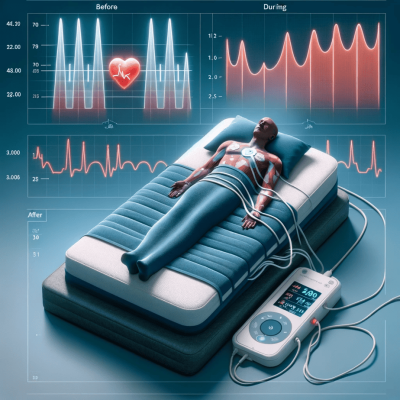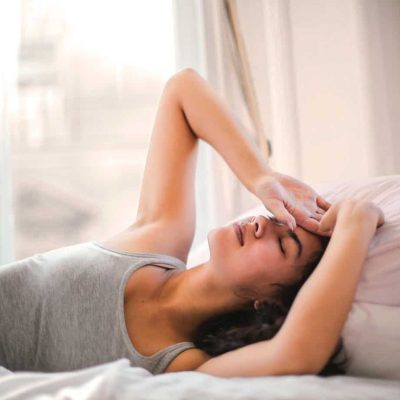In today?s news, we will look into the recent study published in PLoS ONE where researchers examined the impact of COVID-19 on the mental health and sleep quality of college students. Also, we will discover how using non-invasive approaches to affect our emotions could reduce sleep terrors. Finally, according to a Washington State University study, sleep quality affects women’s happiness and job aspirations.
Table of Contents
ToggleHow COVID-19 affected university students’ sleep and mental health
Original Source: How COVID-19 impacted sleep and mental health among university students
In a new study published in PLoS ONE, researchers assessed the impact of COVID-19 on college students’ sleep and mental health.
Young adults face social, academic, health-related, and economical issues due to the SARS-CoV-2 epidemic. Several studies have documented increased MH concerns in the general public mid-pandemic, although data on intra-individual sleep difficulties and MH issues are missing.
The study’s authors studied the impact of sleeping patterns on 78 young people’s MH at New York’s Colgate University between October and November 2020. The subjects’ self-reported anxiety, sleep disturbances, and depression ratings did not differ significantly.
Research
In this study, researchers reported only intra-individual effects among previous study cohort participants with comprehensive pre-COVID-19 and mid-COVID-19 pandemic data, utilizing SARS-CoV-2 as an intervention.
23 Caucasian students of European heritage (four males, 19 females, average age 19) were invited through email to participate in the study. 14 participants were middle-class upper, 1 middle-class lower, and 8 rich.
On school, students were quarantined for 14 days, with only online classes, meals provided to their dorms, and an hour for outdoor activities. After the quarantine period, all students were tested biweekly for SARS-CoV-2 and required to wear masks and maintain social distance between floors.
Nearly 50% of the study courses were offline, and social meetings and sports were limited before samples were collected. The students performed self-reported behavioral surveys, including BDI-II, STAI, PROMIS (patient-reported outcomes measurement information system) for sleep disturbances, reduced MEQ (morningness-eveningness questionnaire), and MSF (mid-sleep point on a free day), computed using MCTQ (Munich chronotype questionnaires).
In Fall 2019 and 2020, study participants wore smartwatches for eight days to collect sleep data. Smartwatches measured sleep length, deep sleep percentage, light sleep percentage, REM sleep percentage, sleep offset and onset, time in bed, and night awakenings. Multiple linear regression was used to examine pre- and mid-pandemic differences and produce odds ratios (OR).
Conclusions
78% of study participants reported greater worry and stress mid-pandemic. Pre-pandemic to mid-pandemic anxiety and sadness symptoms increased clinically.
68%, 45%, and 59% of COVID-19 participants reported less sleep, sleeping later, and worse sleep health. Mid-pandemic sleep disturbances were triple pre-pandemic levels (OR 3.0). Sleep disturbances increased sadness and anxiety, highlighting the adverse relationship between sleep and MH.
Students with more sleep disturbances during COVID-19 had less deep and REM sleep. Mid-pandemic, pupils were four times more likely to report moderate or severe anxiety (STAI 38) and mild depression (BDI 14) than pre-pandemic.
Mid-pandemic anxiety among university students may be attributed to economic constraints, health-related pressures, fear of illness acquisition and its impact on self and close relatives, normal life disturbances, lack of social interactions, job loss, and disturbed sleep habits. Poor sleep affects neuropsychological states, emotion processing, and emotional sympathy.
The study found that COVID-19 significantly affects sleep quality, mental health, and restorative sleep duration in young adults. Deep sleep and REM sleep reductions with higher sleep disruptions could impair the ability to build powerful immune responses in young people. The findings highlight the need to prevent and manage MH and sleep problems, especially among undergraduates.
Scientists find a piano chord can silence nightmares
Original source: Nightmares Can Be Silenced With a Single Piano Chord, Scientists Discover?
Using non-invasive approaches to affect our emotions could reduce sleep terrors.
36 patients with nightmare disorder found that two basic therapy reduced their terrible dreams.
Scientists asked people to rewrite their worst dreams and played uplifting sounds while they slept.
“Dream emotions affect our emotional health,” says psychiatrist Lampros Perogamvros of Geneva University Hospitals and University of Geneva in Switzerland.
“We thought we might help people by influencing their dreams’ emotions. This study shows that nightmare patients can have fewer emotionally intense, bad dreams.”
Nightmares aren’t always a few awful dreams for many folks. Nightmares are linked to poor sleep, which is linked to many health conditions.
Insomnia and nightmares can stem from anxiety and poor sleep. Nightmares and sleep disruptions have increased during the SARS-CoV-2 pandemic, according to recent studies.
Since we don’t know why or how our brain develops dreams, treating chronic nightmares is difficult.
Imagery rehearsal therapy rewrites patients’ worst nightmares with happy endings. They “rehearse” this altered story to overwrite the nightmare.
This approach reduces nightmare frequency and severity, but not for all patients.
In 2010, scientists showed that playing noises associated with a stimuli while sleeping boosts memory of that stimulus. Perogamvros and colleagues wanted to know if TMR could help imagery rehearsal treatment (IRT).
After two weeks of keeping a dream and sleep diary, participants received IRT. Half of the group then underwent TMR to relate a good nightmare to a sound.
The other half imagined a less terrifying nightmare without positive sounds.
Both groups wore sleep headphones that played the piano chord C69 every 10 seconds during REM sleep, when nightmares are most common.
After two weeks of diary entries and three months without treatment, the groups were examined.
The control group averaged 2.58 weekly nightmares and the TMR group 2.94. The control group had 1.02 weekly nightmares, while the TMR group experienced 0.19. The TMR group reported more positive dreams.
At three months, nightmares rose to 1.48 and 0.33 per week in both groups. Using TMR to support IRT leads in a more effective treatment, the researchers stated.
“We were surprised by how well the participants respected and tolerated the study procedures,” Perogamvros explains.
“We saw fewer nightmares and more good dreams. These findings are encouraging for academics and clinicians studying emotional processing during sleep and developing new therapies.”
Current Biology published the research.
Better sleep can boost women’s career objectives
Original source: Good sleep can increase women?s work ambitions
If women want to work harder, they may need more sleep. According to a Washington State University study, sleep quality affects women’s happiness and job aspirations. Sleep quality didn’t affect men’s aspirations.
A two-week survey of 135 U.S. workers found this. Each day, participants indicated how well they slept and their mood, then how they felt about gaining status and responsibilities at work.
When women receive a good night’s sleep and their mood is elevated, they’re more inclined to aim for status and responsibility at work, says lead author Leah Sheppard of WSU’s Carson College of Business. If insufficient sleep affects their good attitude, they are less goal-oriented.
Sheppard and co-authors Julie Kmec of WSU and Teng Iat Loi of UM-Duluth polled full-time employees twice a day for two weeks, for a total of 2,200 observations. The participants answered questions regarding their previous night’s sleep and mood at midday every day and their plans to pursue more responsibility, prestige, and influence at work in the evenings.
Men and women reported good and unsatisfactory sleep quality throughout the research, with no gender difference. Poor sleep reduced women’s aspirations to seek more status at work.
The researchers can only hypothesize why sleep’s impact on mood affects women’s goals but not men’s. They suggest it may be due to gender differences in emotion control and cultural expectations?or a combination of these forces.
Neuroscience research shows that women experience greater emotional reactivity and less emotion regulation than men, and cultural preconceptions of women as more emotional might perpetuate this. Males are stereotypically more ambitious than women, therefore inadequate sleep may not dissuade men from their career goals.
Sheppard said these findings are good news for women seeking job advancement. They might use meditation to help with sleep and mood management, set better work hours, and strive to obtain better sleep.
“It’s crucial to relate objectives to something controlled outside work,” she said. Anyone may improve sleep and mood by taking certain steps.
Summary of today?s sleep health news
To sum it up, in a study published in PLoS ONE, researchers investigated the impact of COVID-19 on college students’ sleep quality and mental health. 68%, 45%, and 59% of COVID-19 participants reported less sleep, later bedtimes, and worse sleep health. Mid-pandemic sleep disturbances were three times pre-pandemic (OR 3.0). Sleep disturbances increased sadness and anxiety, highlighting the adverse relationship between sleep quality and MH.
Additionally, a combination of two simple therapy reduced the frequency of disturbing nightmares in 36 patients with nightmare conditions. In imagery rehearsal therapy, people recreate their worst dreams to end happily. Then, they “rehearse” the altered story to overwrite the nightmare. A sleep headphone headband played the piano chord C69 every 10 seconds during REM sleep when nightmares are most common.
Lastly, according to a Washington State University study, sleep quality affects women’s happiness and job aspirations. Sleep quality didn’t affect men’s aspirations. When women receive a good night’s sleep and their mood is elevated, they’re more inclined to aim for status and responsibility at work, says lead author Leah Sheppard of WSU’s Carson College of Business. If insufficient sleep affects their good attitude, they are less goal-oriented.








